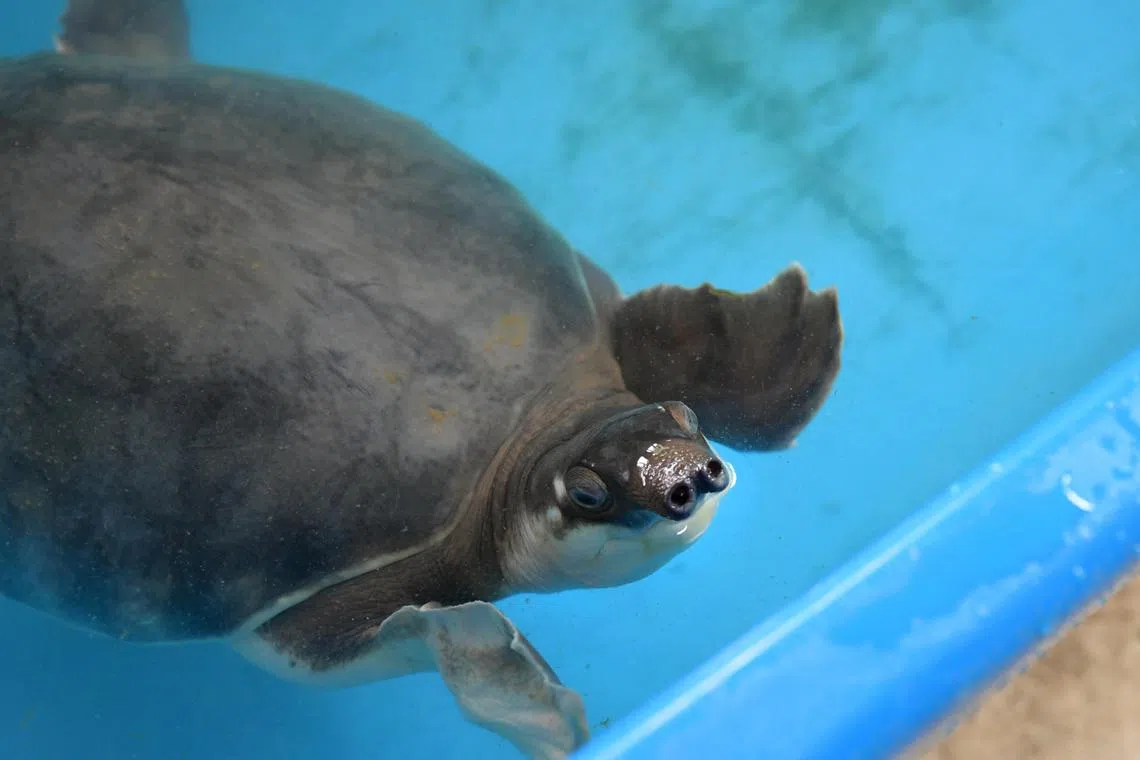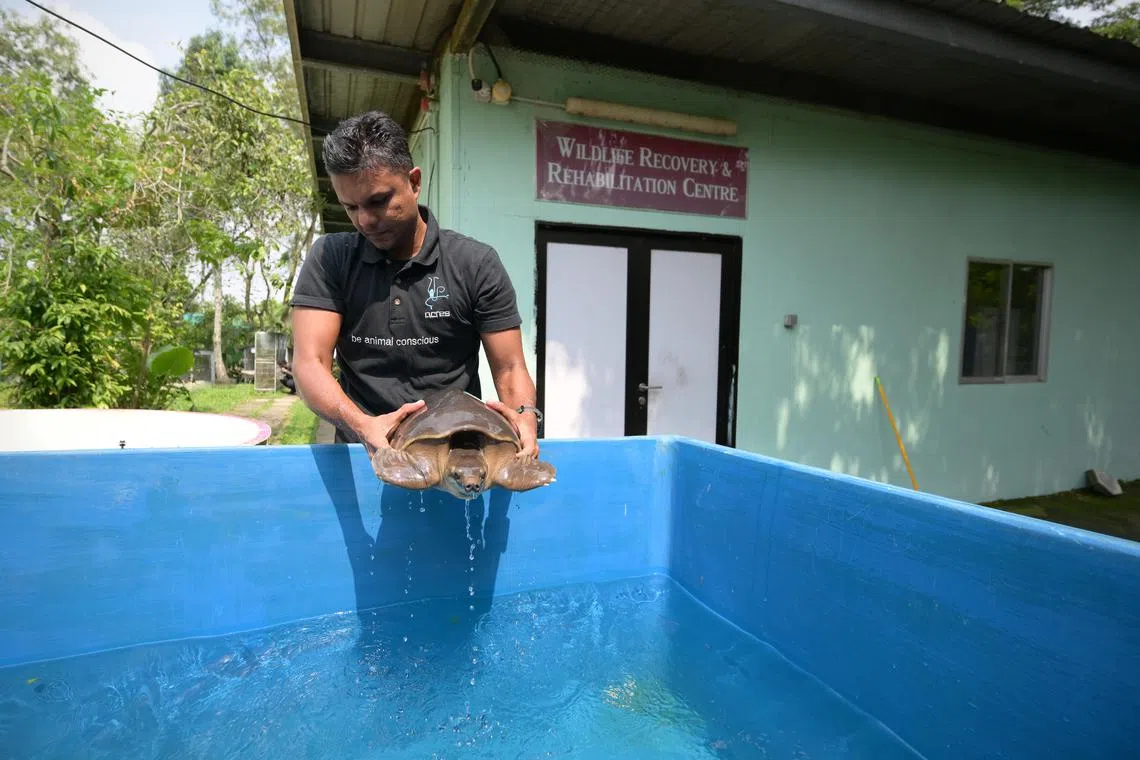Wildlife rescue group Acres hopes to send 30 endangered freshwater turtles back to Indonesia
Sign up now: Get ST's newsletters delivered to your inbox

The thirty pig-nosed turtles under Acres’ care are slated to be repatriated to Indonesia in January 2026.
ST PHOTO: NG SOR LUAN
SINGAPORE - Wildlife rescue group Acres is looking to send 30 endangered pig-nosed turtles, seized from the wildlife trade in Singapore, back to Indonesia in January 2026, The Straits Times has learnt.
The planned repatriation of these freshwater turtles, named for their large, fleshy noses that resemble a pig’s snout, will be one of the group’s biggest and most ambitious yet, its chief executive Kalaivanan Balakrishnan
Acres, or the Animal Concerns Research and Education Society, has repatriated more than 70 animals since it was formed in 2001.
This includes sending 51 Indian star tortoises – considered vulnerable to extinction – back to India in 2018, and two critically endangered giant Asian pond turtles to Malaysia in 2019.
Sending the pig-nosed turtles home will be far more costly, Mr Kalaivanan said. He expects the repatriation of these hefty turtles to cost at least $40,000, for two flights and a boat ride.
Each pig-nosed turtle weighs around 4kg to 6kg. They are fully aquatic and have to be exposed to moisture throughout their journey home, making the journey expensive and complicated, he said.
The cost of repatriating animals to Malaysia is much lower, Mr Kalaivanan said, without citing figures. This is because the animals are transported only across the border, he added.
Pig-nosed turtles are naturally found in Indonesia, Australia and Papua New Guinea. They have a very restricted range, occupying only freshwater and estuarine habitats in the Northern Territory of Australia and New Guinea’s southern lowlands.
They are often traded internationally as exotic pets due to their unique appearance.
It is illegal to keep pig-nosed turtles as pets in Singapore. Only two turtle species – the red-eared slider and the Malayan box turtle – can be legally sold as pets here.
As pig-nosed turtles are poached in large numbers for the pet trade and consumption of their meat, their numbers in the wild have been in steady decline. In 2017, the International Union for Conservation of Nature (IUCN), a global conservation organisation, upgraded the species’ conservation status from vulnerable to endangered.
This reflects the greater threat that human activity is posing to their numbers.
Since 2009, Acres has rescued its 30 pig-nosed turtles in batches.
Some were surrendered by pet owners, while others were found in places like Kallang River and East Coast Park. They have been housed in the organisation’s wildlife rescue centre in Sungei Tengah, which has an area of 0.5ha – roughly half the size of a football field.
Due to the turtles’ highly territorial natures, they are individually kept in small pool tubs with not much room to swim around.
“They are the only animals that I was not able to help in any way, because we didn’t have enough space,” Mr Kalaivanan said.
The pig-nosed turtles, which are not native to Singapore, should not be released into water bodies here as they may interact with and impact local ecosystems and turtle populations, said Mr Kannan Raja, president of the Herpetological Society of Singapore.
Mr Kalaivanan said that since the 2010s, Acres has made multiple attempts to repatriate the turtles, although they were unsuccessful.
But a new contact within the Indonesian government has made Acres’ latest attempt its most optimistic yet, he said.
He added that the turtles’ change in status on the IUCN’s Red List of threatened species from vulnerable to endangered could have made the case for their repatriation stronger.
Many of Acres’ successful repatriations were of species considered endangered or critically endangered, he added.

Acres CEO Kalaivanan Balakrishnan holding up a pig-nosed turtle housed on its premises in Sungei Tengah.
ST PHOTO: NG SOR LUAN
But much is left to do before the turtles can possibly return home next January.
This includes applying for import and export permits, purchasing transport cages and assessing the animals’ ability to swim, forage and survive in the wild, Mr Kalaivanan said.
Pig-nosed turtles are listed in the Convention on International Trade in Endangered Species of Wild Fauna and Flora, an intergovernmental treaty that Singapore is party to. This means that they can be traded internationally only with permits from exporting countries.
Mr Kalaivanan added that the turtles’ diet is being modified to match what they eat in their natural habitat. They are currently transitioning from a captive diet made up of fruits, vegetables, dead prawn and fish to a more natural one that includes wild figs and other wild-type fruits.
Mr Kalaivanan said repatriation efforts not only help wild animals to return to their natural habitats, but also free up space at Acres’ wildlife rescue centre to take more animals in.
“It’s a continuous cycle, until people stop smuggling wildlife,” he said.
Ms Xie Renhui, the National Parks Board’s director of wildlife trade, said the board has a multi-pronged approach to guard against illegal wildlife trade.
Its initiatives include actively enforcing laws, surveilling online and physical marketplaces and taking enforcement action.
“These efforts are aimed at protecting wildlife species, not just iconic species, and are crucial for the biodiversity in our region and beyond,” she said.



